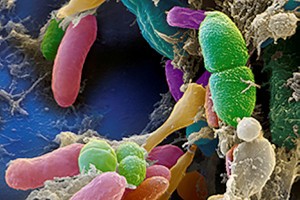 The `human microbiome’ comprises the complex and diverse, microbial ecosystems that colonize different organs and tissues of the human bodies. The human microbiota consists of bacteria, archaea, viruses as well as eukaryotes (e.g. fungi and protozoa), which significantly impact the physiology, homeostasis and overall health of the human body. While the gut microbiome is certainly the most studied human microbial community, knowledge for instance on the lung, oral, skin and vaginal microbiomes is also increasing.
The `human microbiome’ comprises the complex and diverse, microbial ecosystems that colonize different organs and tissues of the human bodies. The human microbiota consists of bacteria, archaea, viruses as well as eukaryotes (e.g. fungi and protozoa), which significantly impact the physiology, homeostasis and overall health of the human body. While the gut microbiome is certainly the most studied human microbial community, knowledge for instance on the lung, oral, skin and vaginal microbiomes is also increasing.
The human microbiome contributes to the regulation of several metabolic functions, trains and develops major components of the innate and adaptive immune system, and protects against pathogens. However, the alteration of the microbiota composition and functions, in addition to genetic risks, has been associated with various systemic and chronic diseases, including neurological, cardiovascular, gastrointestinal, metabolic, respiratory and allergic diseases, as well as cancer. As many studies are finding increasing evidence of important and complex relationships between the human microbiome and diseases, considerable efforts have been made over the past decade to better understand the microbiome–host mechanisms of interactions, as well as how diseases caused by a ‘dysfunctional microbiome’ develop and can be treated. Nonetheless, because the microbiome is a complex and variable microbial community that responds to multiple factors, our current understanding of the microbiota dynamics and impact on disease development remains incomplete.
In support of The United Nation’s Sustainable Development Goals 3 (SDG3), ‘Good health and well-being’, which aims to ‘Ensure healthy lives and promote well-being for all at all ages’, BMC Microbiology published the collection ‘Microbiome dynamics in human diseases’. It highlights research and methods addressing the complex role of the human microbiome, especially in the context of human diseases and biological dysfunctions. By acknowledging that ‘human microbiome research’ is rapidly evolving and fundamentally changing the way we study and treat human diseases, the overall goal of the collection has been to enhance our knowledge on microbiome diversity and functions, microbiome-host interactions and the role of microbiomes in health and disease.
Our collection aims to showcase recent research covering a broad range of topics including, but not limited to:
- Microbiota eubiosis and dysbiosis
- Progress in microbiome-based therapeutics
- Application of ecological principles, biostatistical analysis and machine learning for microbiome-based therapeutics
- Personalized microbiome dynamics
- Mechanistic understanding on how the metabolic environment shapes the microbiome composition and function, and how microbial metabolites affect the host
- Understanding the role and implications of the microbiota gut–brain axis in health and disease
- Host-microbiome interactions and host-environment-microbiome interactions
- Multi-omics and multi-modal technologies applied and integrated to study the microbiome dynamics, the microbiome-disease relationship, and the response to drugs and potential treatments
- Machine learning and artificial intelligence-based computational approaches and models for the analysis of microbiome data and the microbiome-disease relationship
- Computational workflows or pipelines for microbiome analysis
- The diagnostic and prognostic potential of microbiome-based biomarkers in disease
- Microbiome-based novel interventions (e.g. supplementation with prebiotics and probiotics, fecal microbiota transplantation (FMT), dietary changes)
- Diet and its effects on gut microbiome biodiversity and function
- Longitudinal microbiome data analysis
Image credit: Springer Nature
The ‘human microbiome’ comprises the complex and diverse, microbial ecosystems that colonize different organs and tissues of the human bodies. The human microbiota consists of bacteria, archaea, viruses as well as eukaryotes (e.g. fungi and protozoa), which significantly impact the physiology, homeostasis and overall health of the human body. Since the microbiome is a complex and variable microbial community that responds to multiple factors, our current understanding of the microbiota dynamics and impact on disease development remains incomplete.